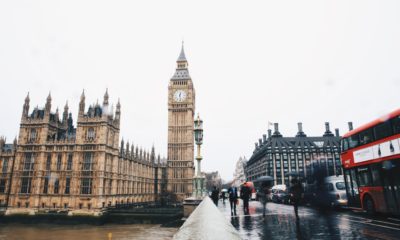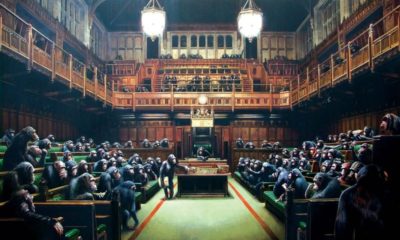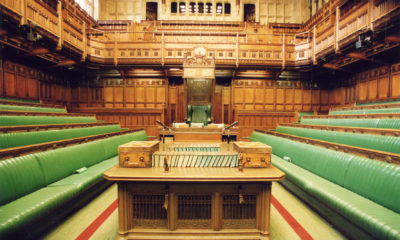Political
Examining the Legal Limits on Parliamentary Sovereignty

Introduction
Parliamentary Sovereignty is the principle that Parliament may make and unmake any laws and that Parliament may not be overruled by any person nor body under the law in the United Kingdom. This essay will look at what the legal limits are on Parliamentary Sovereignty, if there are any.
The idea that Parliament is sovereign, a doctrine that we understand today, has not always been agreed with. Prior to 1688, the courts often had the opinion that the common law had the power to control Acts of Parliament[1]as shown in Dr Bonham’s Case[2], and in Day v Savadge[3]where Hobart CJ held that all laws, even primary legislation, had to be automatically void if they were against natural equity[4]. The position held in Day v Savadge[5]clearly posed a legal limit on Parliament ensuring that Parliament did not have absolute legislative power and that a system of checks and balances were in place to prevent Parliament from legislating irrationally or illegally.
History of Parliamentary Sovereignty
In 1689, the Bill of Rights[6]first asserted limits over the King and gave greater rights and powers to the government, meaning that the government had a large control over the state and legislative powers[7]. Since the Bill of Rights[8], there has been a clear judicial obedience when it comes to Parliamentary Sovereignty as could be evidenced early on by Cockburn CJ stating in Ex p. Canon Selwyn[9]‘There is no judicial body in the country by which the validity of an Act of Parliament could be questioned. An Act of the legislature is superior in authority to any court of law. We have only to administer the law as we find it, and no court could pronounce a judgment as to the validity of an Act of Parliament’ which shows the change in the courts’ opinion from that of Day v Savadge[10]. Judicial obedience towards Parliamentary Sovereignty can be evidenced from Canon Selwyn[11]through Madzimbamuto v Lardner-Burke[12], however, in Jackson v Attorney General[13], both Lord Steyn[14]and Lord Hope[15]brought up the idea, obiter, that ‘Parliamentary Sovereignty is no longer’[16]and that legislative sovereignty is, slowly but surely, being qualified[17], despite this dicta, the House of Lords in Jackson[18]did not rule an Act of Parliament invalid, they merely suggested that the courts may have greater powers over Acts of Parliament in the future.
Despite this evolution of common law and judicial opinion on Parliamentary Sovereignty, the doctrine of Parliamentary Sovereignty, as we understand it at this current time, was theorised by Dicey[19]as having two parts, the first being the positive limb that Parliament may make and unmake any law so long as the majority of the House of Commons approve a bill regardless of its content or purpose. It must be questioned how Parliament is able to have supreme legislative power when it is unable to bind its successors, as a supreme legislative power should be able to legislate to limit their power? Academics have argued this point which leads to the Diceyan ‘continuing theory’[20]that states Parliament is a perpetual institution and do not need to concern themselves with what their predecessors have done[21], alternatively, academics[22]have also discussed the ‘self-embracing theory’ in which holds that Parliaments sovereign power should be able to bind it’s successors and enact legislation that will be safe from amendment by future Parliament[23].
The second part to Parliamentary Sovereignty, as theorised by Dicey[24]is the negative limb, which is that the legality of an Act of Parliament may not be challenged in court meaning that the judiciary are unable to declare an Act of Parliament invalid thus losing a layer of checks and balances, which can be compared to the United States of America[25]where a federal judge may block an Act passed by the legislature or the executive or declare a piece of legislation as unconstitutional.
With Dicey’s theory[26]as the current position of Parliamentary Sovereignty, we can discuss whether there are any limits on Parliamentary Sovereignty and if so, what they are.
Parliamentary Sovereignty Paradox
To begin with, I will discuss the lack of legal limits on Parliamentary Sovereignty. As stated above, Parliament has the unequivocal power to legislate on any matter in the United Kingdom[27]which means that, in theory, Parliament could legislate to limit its own powers in order to prevent the current and future governments from legislating in a certain way, however, the doctrine that Parliament may not bind its successors exists in the UK as was noted by Maugham LJ in Ellen Street Estates Ltd v Minister of Health[28]. Parliament being unable to bind its successors means that Parliament may not place any legal limits on itself, and if it does, it can simply repeal those legal limits rendering those limits, for the time they were in place, purely symbolic.
In addition to this, the idea that if Parliament were able to bind itself and its successors presents a paradox as by limiting its powers, Parliament would no longer be supreme which is impossible since Parliament is always supreme by the overriding principle of Parliamentary Sovereignty. A further question is whether Parliament is truly supreme if it is unable to bind its successors, however, this can be dealt with by looking at the Diceyan ‘continuing theory’ as mentioned before.
From these first few points, we can see that Parliament is unable to place any legal limits on itself or on its successors, although it is worth noting that there are some non-legal limits as formulated by Lord Reid’s remarks[29]. These limits are ones of political considerations and conventions as will be discussed later in this essay.
It is clear to see that whilst Parliament has supreme legislative powers, and in theory it could legislate on itself, it is unable to legally limit itself due to the principle that Parliament may not bind its successors, however, the conflicts between the doctrines of Parliamentary Sovereignty and Parliament being unable to bind its successors creates a paradox and gives rise to academic debate.
Impact of EU Law and Constitutional Conventions
An argument that there are legal limits on Parliamentary Sovereignty comes from the doctrine of European Union[30]Supremacy, although this is no longer a concern due to the European Union (Withdrawal) Act[31],I shall still discuss the legal limits that the EU holds over Parliament until “exit day”[32]. Section 2 of the European Communities Act[33]holds that EU law is supreme over national law which, prima facie, means that the 1972 Parliament had succeeded in binding its successors, primarily noted by Sir William Wade in 1996[34]after the 1991 ruling in Factortame (No 2)[35]. Whilst Sir William Wade argued that the UK is no longer sovereign as a result of European Union supremacy, the decisions in Thoburn v Sunderland City Council[36]and R (HS2 Action Alliance Ltd) v Secretary of State for Transport[37], go on to suggest that the 1972 Act[38]is a constitutional statute thus not subject to the doctrine of implied repeal; it may only be repealed if a subsequent piece of legislation explicitly repeals the 1972 Act[39]. In practice, the question of whether Parliament may be supreme over EU law, whilst still a member of the EU, by intentionally repealing the 1972 Act[40]is something we are unlikely to ever know the answer to as a result of the United Kingdom’s scheduled departure from the EU later in 2020, however, what we do now know is that the EU will no longer be supreme over Parliament, after ‘exit day’ due to the express repeal of the European Communities Act[41]by the European Union (Withdrawal) Act[42].
On top of this, there is a question as to whether a referendum may override Parliamentary Sovereignty as there have been long debates over whether Parliament may simply ignore the result of the 2016 referendum. Referendums are not legally binding, as was made clear after the result of the 2016 referendum meaning that Parliament may simply ignore the result of any referendum constitutionally, however, the only restraint on Parliament doing so is a political one as to ignore a referendum result may be viewed as undemocratic and may lead to rising tensions by both Parliamentarians and the general public.
Leading on from the above political constraints, there are non-legal limits to Parliamentary Sovereignty in the form conventions and political considerations. Whilst this essay focuses on the legal limits of Parliamentary Sovereignty, it is worth briefly noting the non-legal limits to fully explore how Parliamentary Sovereignty may be limited and whether these non-legal limits may be turned into legal limits.
Within the UK constitutional law, there are constitutional conventions – uncodified rules with no legal backing that each government choose to follow. A few key conventions are that the Prime Minister alone will advise the Monarch on the dissolution of Parliament, and that the Monarch will grant a dissolution of Parliament if requested – as can be evidenced recently with the Queen granting a dissolution of Parliament at the request of Boris Johnson[43], although this prorogation was found to be unlawful by the Supreme Court[44].
Parliament will seldom depart from these conventions, and if it does, it will have a good reason for doing so – whilst Parliament is not required to follow convention, it does, which demonstrates a limitation on Parliamentary Sovereignty. Further to this, political considerations will also have an impact on Parliamentary Sovereignty as Members of Parliament will not want to legislate on a matter that makes them unpopular, for example, drawing upon Sir Leslie Stephen’s example; Parliament could legislate that all babies born with blue eyes must be killed, however, it would not do this in practice as it would damage their political image[45]. This clearly shows that although Parliament may legislate on anything it pleases, it is limited by political considerations as members of Parliament are elected to serve in the best interests of the people they represent.
It is clear to see, that the main legal limit on Parliamentary Sovereignty is European Union supremacy, however, it has been suggested by the HS2 case[46]and Thoburn[47]that the 1972 Act[48]is a constitutional convention and may be repealed, whilst still a continuing member state, thus making Parliament supreme – however, with the scheduled departure from the EU, we will likely never know whether this would be true in practice. It is also clear that Parliament are limited by non-legal factors such as convention and political considerations, whilst these are not legally limiting, they do limit Parliament’s actions significantly as Parliament will not act however it pleases and it will not legislate however it pleases.
Judicial Review and Parliamentary Sovereignty
Another legal limit to consider is that of judicial review. Judicial review is the process by which decisions made by public bodies may be challenged through the courts, judicial review has often been seen as a way to ensure that public bodies act properly and intra vires, its importance and purpose in society has often been discussed, including by Alexander Hamilton in Federalist no.78[49]when he said “the courts were designed to be an intermediate body between the people and the legislature, in order, among other things, to keep the latter within the limits assigned to their authority”. As a result of judicial review challenges, the courts may impose a mandatory, prohibiting or quashing order or grant an injunction against the public body, this means that any ministerial decision by Parliament can be challenged and have a legal limit imposed.
However, primary legislation, as a general rule, cannot be judicially reviewed as it is seen that primary legislation has gone through the whole legislative process of Parliament[50]. This begs the questions of whether judicial review really does impose a legal limit on Parliamentary Sovereignty if Parliament is still free to legislate without being judicially reviewed? The simple answer would be no, however, an exception to the above rule is that an Act of Parliament may be judicially reviewed if it is incompatible with EU law[51]in line with the Human Rights Act[52]. An example of this comes from Bellinger v Bellinger[53]whereby Section 11(c) Matrimonial Cases Act[54]was declared incompatible with the Human Rights Act[55]which lead to Parliament introducing the Gender Recognition Act[56].
Whilst Parliament are not legally limited in respect of their primary legislative powers by the courts, its pieces of secondary legislation may be judicially reviewed and may be ‘blocked’ by the courts if Parliament are acting illegally, irrationally or improperly[57]posing a legal limit on Parliament’s actions.
In addition to this, there is the idea of common law radicalism which suggests that in extremis the courts would act to stop Parliament. This idea, although has never become a reality, is most notably associated with Professor Trevor Allan[58]and was mentioned in his book[59]at page 133. In addition to this, common law radicalism has received some judicial backing, as mentioned before by Lord Steyn and Lord Hope in Jackson[60]but also by Lady Hale in Jackson[61]as she stated “The courts will treat with particular suspicion (and might even reject) any attempt to subvert the rule of law” whilst discussing Parliamentary Sovereignty.
It is clear that whilst declarations of incompatibility do not invalidate Acts of Parliament, they do place a pressure on Parliament to amend incompatible legislation as can be evidenced from Bellinger v Bellinger[62]. However, as the courts are unable to invalidate legislation, they may only declare it incompatible, we can see that Parliamentary Sovereignty is not legally limited by judicial review, only politically limited, showing that whilst judicial review poses a legal limit in respect of secondary legislation and decisions by public bodies, Parliament is not limited in its legislative powers by the courts, despite the evolvements in the law stemming from the Human Rights Act[63]. Moreover, we can see that secondary pieces of legislation and decisions made by Parliament may be judicially reviewed and blocked, posing a legal limit. Overall, I think we can conclude that whilst Parliamentary Sovereignty is not threatened by judicial review, it does have some minor limitations.
In addition to this, we can see that the idea of common law radicalism does present a legal limit on Parliamentary Sovereignty as the courts have suggested that they would prevent Parliament from subverting the rule of law, however, common law radicalism has never been put into practice and therefore cannot pose a legal limit on Parliamentary Sovereignty at this current time.
Role of the Monarch
One final argument to put forward is for a possible limit on Parliamentary Sovereignty. The UK has a Constitutional Monarchy, meaning that the reigning Monarch is the head of state and retains various powers – although, these powers have declined significantly since the 17thcentury and the ‘Glorious Revolution’ of 1689 and more of the monarch’s powers had been given to Parliament. By the beginning of the 20thcentury, the monarch’s powers had almost entirely been passed onto Parliament[64]. However, one of the powers of the Monarchy is to give royal assent to bills in order to bring them into completion into UK law. When a bill has been passed by Parliament, it must go to the Queen who may give royal assent or refuse to give royal assent. The Queen will act on the advice of her ministers as a matter of convention as, in practice, to go against the advice of her ministers would cause a constitutional crisis, however, I will look at whether the Queen may, in theory, be able to place a legal limit on Parliament’s legislative powers. It is worth noting that, historically, the Monarch has refused royal assent on the advice of his or her ministers such as when Queen Anne withheld assent in 1708 to the Scottish Militia Bill[65]showingthe powers that the Monarch held over Parliament. However, since its use in 1708, the withholding of royal assent has fallen into disuse since King George IV’s reign and with King George V stating, in regard to the Government of Ireland Bill, that he would not withhold assent without “convincing evidence that it would avert a national disaster, or at least have a tranquillising effect on the distracting conditions of the time”[66].
Throughout all academic debate, one pattern is followed throughout and that is the idea that the Queen may only refuse royal assent on the advice of her ministers as stated by Anne Twomey[67]and as is accepted by constitutional convention.
However, a counter-argument posed by Twomey[68]is that ‘in the event of a hung-Parliament, if a bill of significance were to be passed against the wishes of the government, doubts would arise as to the responsibility of ministers and whether they are entitled to advise the Queen on the refusal of the bill’. Twomey[69]suggested that in this event, the Queen may be able to disregard the governments advice and refuse a bill legally without causing a constitutional crisis, this theory has been agreed with by Professor Mark Elliot[70]. This idea was also discussed by Nick Barber[71]who states that it would be undemocratic to allow the leader of a party without a working majority to advise the Queen to refuse royal assent, just as it would be undemocratic to allow the Queen to refuse royal assent on her own, as the leader of a minority government does not speak for the majority. This idea may be made into a topic of debate as Boris Johnson lost his working majority in September 2019[72]raising the question as to whether it would be democratic for him to advise the Queen, in the alternative, to refuse royal assent to the second European Union (Withdrawal) Act[73]. However, as this did not happen the idea will remain as a topic for academic debate only.
Overall, whilst the Queen, in practice, will follow the advice of her ministers and will grant royal assent as a formality, we can see that there is an argument in which the Queen may disregard the advice of her ministers and refuse royal assent in the event of a bill of significance passing through a minority Parliament against the governments wishes[74]. In this instance, the Queen would be imposing a legal limit on Parliamentary Sovereignty, however, in practice, a refusal of royal assent would likely cause a constitutional crisis and as the Queen does not involve herself with politics as a matter of convention, the likelihood of the Queen withholding royal assent against the advice of her ministers is extremely slim.
Conclusions
In conclusion, having examined the possible legal limits to Parliamentary Sovereignty, with a particular focus on Parliament’s power to bind itself, the impact of the EU, Judicial Review and the Monarchy, we can see that whilst there are a few potential legal limits to Parliamentary Sovereignty, Parliament’s Sovereignty is not particularly limited.
I consider the only real limit to Parliamentary Sovereignty to be EU supremacy as Parliament must abide by the EU’s rule of law. However, as stated before, due to the UK’s scheduled departure from the EU, we will likely never know whether this was a true legal limit and, in any event, there will be no limit once (or if) the UK leaves the EU as Parliament will be the highest legal power in the UK once again.
[1]Neil Parpworth, Constitutional & Administrative Law (10th edn, Oxford University Press 2018).
[2]Dr Bonham’s Case (1610) 8 Co. Rep. 114 at 118a – Coke CJ, held in this case that the common law could control Acts of Parliament, a position which goes against parliamentary sovereignty.
[3]Day v Savadge (1614) Hob 85; 80 ER 235 at 237
[4]Ibid – Hobart CJ stated, ‘even an Act of Parliament, made against natural equity, as to make a man judge in his own case, is void in itself, for jura naturae sunt immutabilia, and they are leges legum’.
[5]Op. Cit., n 3
[6]Bill of Rights 1869
[7]Op. Cit., n 1
[8]Op. Cit., n 6
[9]Ex p. Canon Selwyn (1872) 36 J.P. 54
[10]Op. Cit., n 3
[11]Op. Cit., n9
[12]Madzimbamuto v Lardner-Burke [1969] 1 AC 645 at 723 – Lord Reid, in the Privy Counil, stated that “It is often said that it would be unconstitutional for the United Kingdom Parliament to do certain things, meaning that the moral, political and other reasons against doing them are so strong that most people would regard it as highly improper if Parliament did these things. But that does not mean that it is beyond the power of Parliament to do such things. If Parliament chose to do any of them the courts could not hold the Act of Parliament invalid.”
[13]Jackson v Attorney General [2005] UKHL 56
[14]Ibid at 102
[15]Ibid at 104
[16]Ibid
[17]Ibid
[18]Ibid
[19]A. V Dicey, Introduction to The Study of The Law of The Constituion (Macmillan 1889).
[20]Alex Carroll, Constitutional and Administrative Law (3rd edn, Pearson Education UK 2003).
[21]Ian Loveland, Constitutional Law, Administrative Law, And Human Rights: A Critical Introduction (8th edn, Oxford University Press 2018).
[22]N. W. Barber, ‘The Afterlife of Parliamentary Sovereignty’ (2011) 9 International Journal of Constitutional Law.– H. L. A. Hart presented the self-embracing sovereignty theory as a possible type of legislative power.
[23]Op. Cit., n 21 at p.31
[24]Op. Cit., n 19
[25]Hereafter referred to as ‘USA’
[26]Op. Cit., n 19
[27]Hereafter referred to as ‘UK’
[28]Ellen Street Estates Ltd v Minister of Health (1934) 1 KB 590 at 597
[29]Op. Cit., n 12
[30]Hereafter referred to as ‘EU’
[31]European Union (Withdrawal) Act 2018, Section 1
[32]Ibid
[33]European Communities Act 1972, Section 2
[34]H. W. R. Wade, ‘Sovereignty: Revolution or Evolution?’ (1996) 112 Law Quarterly Review.
[35]R v Secretary of State for Transport Ex p. Factortame Ltd (No.2) (1991) 1 AC 603
[36]Thoburn v Sunderland City Council [2002] EWHC 195 (Admin)
[37]R (HS2 Action Alliance Ltd) v Secretary of State for Transport [2014] UKSC 3 – hereafter referred to as the ‘HS2 case’
[38]Op. Cit., n 33
[39]Ibid
[40]Ibid
[41]Ibid
[42]Op. Cit., n 31
[43]‘Queen Approves Parliament Suspension’ (BBC News, 2019) <https://www.bbc.co.uk/news/uk-politics-49493632> accessed 31 August 2019.
[44]R (Miller) v The Prime Minister [2019] UKSC 41
[45]Op. Cit., n 1 at p.57-58
[46]Op. Cit., n 37
[47]Op. Cit., n 36
[48]Op. Cit., n 33
[49]Alexander Hamilton, James Madison and John Jay, ‘The Federalist Papers’ (1788).
[50]Emily Carter, ‘Judicial Review and Secondary Legislation: What Power Does the Court Have to Fix Broken Legislation? | Public Law Blog | Kingsley Napley’ (Kingsleynapley.co.uk, 2019) <https://www.kingsleynapley.co.uk/insights/blogs/public-law-blog/judicial-review-and-secondary-legislation-what-power-does-the-court-have-to-fix-broken-legislation> accessed 3 September 2019.
[51]Ibid
[52]Human Rights Act 1998, Section 7
[53]Bellinger v Bellinger [2003] UKHL 21
[54]Matrimonial Cases Act 1973, Section 11(c)
[55]Op. Cit., n 52 at sections 8 and 12
[56]Gender Recognition Act 2004
[57]Council of Civil Service Unions v Minister for the Civil Service[1984] UKHL 9, Lord Diplock’s ‘grounds for review’
[58]Stuart Lakin, ‘The Sovereignty of Law: Freedom, Constitution and Common Law By Professor Trevor Allan: Some Preliminary Thoughts’ (UK Constitutional Law Association, 2019) <https://ukconstitutionallaw.org/2014/02/04/stuart-lakin-the-sovereignty-of-law-freedom-constitution-and-common-law-by-professor-trevor-allan-some-preliminary-thoughts/>
[59]T.R.S Allan, The Sovereignty of Law: Freedom, Constitution and Common Law (Oxford University Press 2015).
[60]Op. Cit., n 13
[61]Ibid at 159
[62]Op. Cit., n 53
[63]Op. Cit., n 52
[64]‘Monarchy’ (politics.co.uk, 2019) <https://www.politics.co.uk/reference/monarchy> accessed 3 September 2019.
[65]Scottish Militia Bill 1707
[66]Anthony Wilfred Bradley and Keith D. Ewing, Constitutional and Administrative Law (13th edn, Longmans 2003).
[67]Anne Twomey, The Veiled Sceptre (Cambridge University Press 2018).
[68]Ibid
[69]Ibid
[70]Mark Elliott, ‘Can the Government Veto Legislation By Advising The Queen To Withhold Royal Assent?’ (Public Law for Everyone, 2019) <https://publiclawforeveryone.com/2019/01/21/can-the-government-veto-legislation-by-advising-the-queen-to-withhold-royal-assent/> accessed 3 September 2019.
[71]Nick Barber, ‘Nick Barber: Can Royal Assent Be Refused On The Advice Of The Prime Minister?’ (UK Constitutional Law Association, 2019) <https://ukconstitutionallaw.org/2013/09/25/nick-barber-can-royal-assent-be-refused-on-the-advice-of-the-prime-minster/> accessed 3 September 2019.
[72]‘Brexit: The Government Has Just Lost Its Majority – CBBC Newsround’ (Bbc.co.uk, 2019) <https://www.bbc.co.uk/newsround/49566301> accessed 28 September 2019.
[73]European Union (Withdrawal) (No. 2) Act 2019
[74]Op. Cit., n 67
Legal
Look at Afghanistan; why human rights are inextricably linked with the rule of law

Behind the guise of legality, numerous injustices have disregarded human dignity. Yet, in modern society, we often dangerously misinterpret justice and legality as synonymous. One such atrocity is ‘slavery’. However, Raz claims that ‘slavery’, does not infringe on a state’s capacity to govern within the boundaries of the rule of law.
This is because Raz views the law through the lens of the present, ie what it is, as opposed to future aims, ie what it should be. In doing so, Raz separates the ‘law’ from any ideological, moral or philosophical ideas. Raz outlines that the law can do good and bad and has no inherent moral philosophy attributed to it. Raz’s definition makes no distinguishment between mere legality and a law that embodies justice.
However, I find this theory disagreeable, as it neglects the relationship between human rights and the rule of law.
It is generally agreed that the primary function of the rule of law is to protect citizens from unpredictable and/or arbitrary powers (of the government or other citizens). This is impossible to do without recognising and encouraging human rights. If human rights are not upheld, the position of a group or individual within a society is not guaranteed to be secure and thus can be changed unpredictably and/or arbitrarily. One cannot protect or ensure stable prospects if their status in society is akin to a torturous limbo.
Now, direct your attention to the current situation in Afghanistan, where citizens fear day-to-day activities in case of arbitrary power used against them. Particularly affecting women and girls. One may draw attention to female education. Whilst currently girls are allowed to attend school, the situation is growing uncertain and fearful. Without any formal recognition of the right to female education, many families may choose to not send their daughters to school, or institutions may not enrol girls just in case of a change or growing extremist pressures. Likely, pubescent girls will not be able to gain an education. Living in fear, unsure of one’s status and rights day-to-day, is not recognising the rule of law.
Raz may argue; if there is an intelligible and accessible law banning female education, that this would constitute the rule of law. However, this is incorrect as it discriminately disregards human dignity, whereas, within the rule of law, the law must view everyone equally. This is not an ideological statement, but a practical one. If the law can arbitrarily persecute one group, there is no logical boundary preventing the persecution of another group, as all humans are made equally. The law cannot discriminate.
But what if nobody was allowed an education?
If we are to take Raz’s argument to its extreme it is still flawed. This is because no country that respects human dignity would ban or pervert education, as this can be linked to other fundamental rights. Any country that threatens to ban education essentially imprisons and enslaves its citizens, tyrannically stripping rights and causing a power imbalance between government and citizens.
I echo Bingham’s opinion, that the rule of law and human rights are inextricable. Any law that offends human rights does not align with the rule of law or good governance, as there is a distinction between mere legality and observing the rule of law.
Hosseini, an extract from A Thousand Splendid Suns;
‘“It is my responsibility to maintain order”…She was stunned that he’d used that word in the face of all that the Mujahideen factions had done- the murders, the lootings, the rapes, the tortures, the executions, the bombings, the tens of thousands of rockets they had fired, heedless of all the innocent people who die in the crossfire. Order. ‘
The law, as a tool, should be used positively, carving parameters of a present and ideal future society, ie what it should be. This ensures that human rights are predictable not only today but should be upheld in future generations too. By implementing such irremovable rights, a citizen’s position within society is secure and predictable for the future, decreasing the potential for the future tyrannical rule, encouraging good governance.
In the current global political climate, we must not be blind. Order is not a good order. Without distinguishment, we cannot hold ourselves or others accountable for actions that disregard human rights and dignity. The notion that we should not aim for a world where human rights are respected, or at least regarded as inextricable to the rule of law, is a world that does not value human dignity. No good order, no peace can be birthed from a land tense with fear and arbitrary actions. Ironically, Biden’s recreant retreat from the ‘forever war’ has reinflicted suffering, in the name of order. When will we learn?
The rule of law is inextricable from human rights.
Legal
The UK Constitutional Framework: Twists and Turns

The United Kingdom is unusual in having no constitution set out in a single document. But the history of the last hundred years of near universal suffrage has not suggested that this has been an impediment to the operation of a successful parliamentary democracy and calls for change in this area, although frequent, have given rise to little visible public support. Yet our constitution has certainly not been static in this period. Both devolution to Scotland, Wales and Northern Ireland and our membership of the EU – as well as our departure from it – have all given rise to significant constitutional change.
Underpinning our system are largely unwritten rules of conduct for the executive and Parliament that create the trust which is essential for a political community to function and for minorities to accept majority decisions. This is a process of debate and legislation conducted within ground rules that ensure that all sides will feel that a matter of importance has been properly considered, with divergent views taken into account. It also provides a framework that conditions the use of executive power when the government enjoys a parliamentary majority, preventing abuse and supporting the right to opposition. When it is working, it has been one of our country’s defining strengths; both in the flexibility it gives government and in identifying us as a political community united by the way we govern ourselves.
But there are, to my mind, worrying signs that this framework is in danger of being abandoned. Recent events have created a number of instances where the government has departed dramatically from these standards.
The first example is the attempt at proroguing Parliament by the PM in September 2019. As a royal prerogative power to be exercised on the advice of the PM, it should have been obvious that it should not be used to silence Parliament at a time of national crisis, however convenient it might have been to the government to avoid parliamentary scrutiny when it was mired in a crisis with the EU on the terms of our departure. Yet not only did the government proceed with prorogation, but it also did not tell the truth about its plans to do so and was unable, when challenged in court, to provide a valid constitutional basis for it, relying in reality on an argument that the power to prorogue was a naked political power that was non-justiciable.
A similar slide from acceptable constitutional practice can be seen in the November decision to amend the Internal Market Bill in a way that was in clear breach of our inter- national legal obligations under the Northern Ireland Protocol of the Withdrawal Agreement. There was of course nothing legally to prevent the government acting in this way. Under our dualist system, an international legal obligation is unenforceable in our courts without domestic legislation and the government was going to repeal that legislation. But to deliberately break international law in this way was unprecedented by a UK government. It also required the PM to ignore his own Ministerial Code that included a requirement for ministers to respect the rule of law – which previous UK governments had argued in court included international law as well. Notably, participation in drafting the legislation was in breach of the Code of Conduct for Civil Servants for the same reason. But the Cabinet Secretary instructed them to ignore its terms to conform to the PM’s instructions.
When I was Attorney General, it was a part of the Attorney’s role not just to advise on the law but also to seek to ensure that a government behaved with propriety. It was part of the Attorney’s remit to do this because it was the policy of successive governments that they should be seen at all times to be doing so. In the case of the Internal Markets Bill, the present Attorney not only provided a “legal” justification for breaching international law that fell well outside the range of what was reasonably arguable, but also reinterpreted the Ministerial Code in contradiction of the government’s previous position, thus avoiding the embarrassment of the PM having to rewrite the Code first.
It may be hoped that these examples are a reflection of the extraordinary pressures that the government was under during the Brexit process. But such cavalier disregard for both the rule of law and constitutional convention has the potential for long-term effects. The handling of the Covid-19 crisis has seen an astonishing abandonment of ordinary rules of legislative propriety. Helped by a largely complaisant House of Commons, the Government has been enabled to enact and exploit loosely worded legislation giving it the power to regulate and penalise individuals by creating serious criminal offences by decree, without even the need for advance parliamentary approval. Not surprisingly, some of the rules have been so broad as to give rise to arbitrary enforcement and injustice. Of course, some of this may have been excusable by the nature of the current emergency, but none of it was an inevitable necessity. Rather, the measures were simply short-cuts taken for the sake of convenience. Again it was noticeable that when the Secretary of State for Health came out with dire and frankly ridiculous threats of ten year sentences for forgery for providing misleading information on a health information form, it did not look as if the Law Officers had been consulted about this policy statement at all.
Fortunately for us, these failings in our democratic processes are not at present fatal to its continuance. The Supreme Court stepped in to check the capricious abuse of the power of prorogation by the PM by interpreting the law, and the House of Lords fulfilled its remit as a revising chamber by removing the offending clauses of the Internal Markets Bill which had domestic and international opinion mobilised against them. But that is not the same as good and quiet governance to which wise governments should seek to aspire. As we head towards the next big crisis (probably with Scotland) and see the headlines filled with stories of internecine feuds within a Downing Street “Court”, we should not be complacent and assume that politics is all about the chaotic exercise of power moderated only by General Elections. We have in the past enjoyed, and are entitled to, better.
Legal
A Runaway Decision? Discussing and Defending R (Plan B Earth) v Secretary of State for Transport

Few events have generated quite the volume and complexity of litigation as the Heathrow expansion. In Plan B, the Court of Appeal decided that the Secretary of State’s (SoS) decision to designate a National Policy Statement (NPS) under s.5 of the Planning Act 2008—supporting plans to build a third ‘north-west’ runway at Heathrow—was unlawful. While environmental campaigners may hail the decision as a triumph against globally polluting mega-corporations, its real intrigue lies in its robust use of unincorporated treaties to determine the scope of domestic law obligations, and the Court’s determination to provide a remedy in circumstances where the unlawful decision may have been retrospectively corrected.
The Facts
When the SoS designates an NPS (under the Planning Act 2008, s.5), planning applications must be decided in accordance with it. The SoS supported the Heathrow expansion in the UK’s ‘Airports National Policy Statement’ (ANPS). Three grounds of appeal were made. Two concerned EU law, which failed. The third, which succeeded, challenged the SoS for failing to take into account a relevant consideration: the Paris Agreement 2016.
In making an NPS, the SoS must, under the Planning Act 2008 s.10(3), ‘have regard to the desirability of… mitigating, and adapting to, climate change’ and, under s.5(8), give reasons as to how the NPS takes government policy on climate change into account. It was common ground, however, that he did not consider the Paris Agreement 2016, an unincorporated international treaty. Indeed, he had received legal advice that he was ‘not permitted as a matter of law to take [the Agreement] into account’ ([237]).
Treaty Incorporation
The issue that arose was whether the SoS was required to take the Paris Agreement into account as ‘government policy’. In deciding that it was a relevant consideration, the Court has been accused of incorporating international law ‘through the back door’: that is, without the consent of Parliament. Mills (2020) sees a tension with this outcome and the principle of ‘dualism’ in the British Constitution, by which treaties do not form part of domestic law ‘until incorporated by legislation’. Campbell (2020) also questions the desirability of requiring the Agreement to be taken into account, because the ‘political substance’ of the decision is left open to challenge, transgressing the Court’s judicial function. I will test both criticisms in turn.
To Mills, we first must assert that the Court is not acting on its own terms, giving the Paris Agreement a life of its own. It is given a clear warrant to do so by s.5(8) of the Planning Act 2008, which requires ‘government policy’ on climate change to be taken into account. If it is correct to consider the treaty ‘government policy’ (our second criticism, considered later) then the conclusion is surely that the Court is requiring something ‘conventional’ ([230]): that the ‘executive must comply with the will of Parliament’ ([229]).
Furthermore, using unincorporated treaties to define the scope of statutory obligations is not a radical, controversial prospect; indeed, it is entirely conventional. For example, in R (Al-Jedda) v Defence Secretary, the House of Lords used several unincorporated treaties (UNSC Res 1545 and Article 103 of the UN Charter) to define the scope of rights under the Human Rights Act 1998. Several other cases follow the same example, such as Occidental Exploration v Ecuador.
To Campbell, we start with the Cambridge English Dictionary’s definition of ‘policy’: ‘a plan of what to do [that] has been agreed to [by] a government’. With this definition in mind, several factors are pointing towards the Court’s decision being correct. Not only did the Government ratify the treaty in 2016 (making it a ‘plan’ that has been ‘agreed to’), they actively agreed to adhere to it in several Ministerial statements ([237]). As the Court correctly states, ‘policy is necessarily broader than legislation’ ([224])
Moreover, a narrow definition of policy would be undesirable from the perspective of good administration. This case sets a precedent that the Government must adhere to its promises, preventing Ministers from breaking political commitments with impunity. This is not a challenge to the ‘political substance’ of the decision, as Campbell suggests, but the legitimate use of an unincorporated treaty, through the warrant of statute, to ensure the Government does not regress from its promises.
The Question of Relief
The Government then argued that the court should refuse to grant a remedy. This was because, even though the SoS had not taken the Paris Agreement into account when developing the ANPS, he would still have considered it when individuals apply for specific projects related to the policy. Thus, it would be ‘highly likely’ that the outcome would not have been ‘substantially different’ if the Paris Agreement had been taken into account, per s.31 of the Senior Courts Act (SCA) 1981 ([274]).
Nevertheless, the Court granted a declaration of unlawfulness. It did not matter that the unlawfulness in the policy designation could have been rectified later: it was ‘incumbent on the Government to approach the decision-making process in accordance with the law at each stage’ ([275]). Furthermore, the public interest in climate change issues would have warranted the provision of a remedy in any case ([277]), per SCA 1981 s.31(2B).
It is easy to see why Campbell (2020) has criticised the case as ‘insufficiently cautious’ with the provision of remedies. The modification of the SCA 1981 was intended to expand the number of cases in which courts would refuse to provide a remedy from the stringent Simplex test. Under this old test, it was necessary to show that the decision-maker ‘necessarily’ would still have made the same decision. This threshold was lowered because the Government was concerned with ‘busybodies’ challenging, for example, planning decisions—abusing judicial review and disrupting infrastructure.
Despite this, the Court stated that ‘Parliament has not altered the fundamental relationship between the courts and the executive’ ([273]). This means that, even under the Act, courts should not assess the ‘merits’ of the decision. For this reason, it will be ‘difficult’ or even ‘impossible’ to refuse a remedy where there has been an error of law ([273]).
There is a paradox at the heart of this dictum. The Court seems cautious by refusing to contemplate the merits of the decision; but, in so doing, the judges are expanding, not restricting, their powers. Under the pretence of keeping to their proper role, they are ensuring that the rule of law is upheld to a standard not far from the original Simplex test. I would suggest that this is because the Court is overusing the term ‘merits’. Assessing the ‘merits’ is asking the question: is the decision correct? This is not what the Court is asking by refusing to grant a remedy. It is asking: what are the likely implications of the decision? These questions are related, but they are not the same. Indeed, if the Court is cautious to consider the implications of a decision it is hard to see when a remedy would ever be, in reality, refused.
Nevertheless, the decision is correct on the facts. Two points should be remembered. First, the Court was especially firm because the SoS had received legal advice to the effect that the Government was not permitted to take the Paris Agreement into account. This was a clear ‘misdirection’ in law ([275]), and it is possible to see why this is—at least slightly—more significant than neglecting to consider the Agreement. Second, the Court did not quash the decision, instead merely granting a declaration of unlawfulness. I would suggest this, in fact, takes careful consideration of the seriousness of the error and the consequences of the breach.
Conclusion
Although, at first glance, this case might look like judicial overreach, I have argued that Plan B enforces reasonable, robust limits on administrative discretion. The Government has decided not to appeal this decision—little wonder, given Boris Johnson’s pledge to ‘lie down in front of those bulldozers and stop the construction’ (Carrington (2020), The Guardian)—but Heathrow will do. The fasten-seatbelt sign has come on: there is more turbulent legal thinking to come.
Many thanks to Frederick Cheng for his valuable comments on the first draft of this article and to Professor Alison Young for her initial guidance. All remaining errors are my own.
-

 Legal2 years ago
Legal2 years agoHow we can defend and protect rights in the time of Coronavirus (COVID-19)
-

 Legal2 years ago
Legal2 years agoLook at Afghanistan; why human rights are inextricably linked with the rule of law
-

 Legal3 years ago
Legal3 years agoThe right to protest in a Covid-19 era
-

 Legal3 years ago
Legal3 years agoA Public Health Approach to Tackling Racism
-

 Legal3 years ago
Legal3 years agoA Runaway Decision? Discussing and Defending R (Plan B Earth) v Secretary of State for Transport
-

 Legal3 years ago
Legal3 years agoTrump: the most prolific execution President in over 130 years
-

 Legal7 months ago
Legal7 months agoIs unjust enrichment really concerned with enrichments?
-

 Economic3 years ago
Economic3 years agoWhat is the Rule of Law and What Difference Does it Make?











